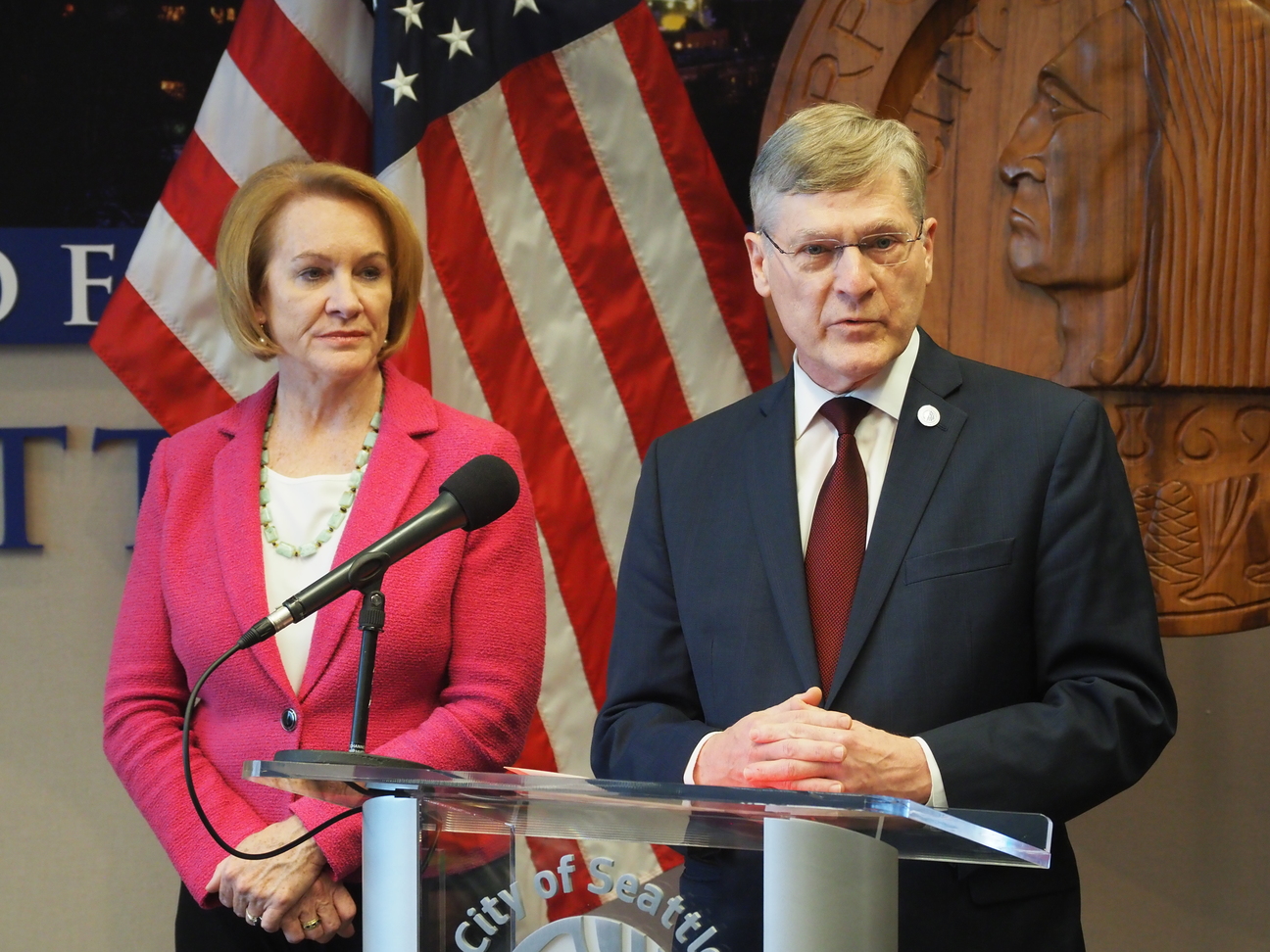The City of Seattle will join King County in initiating a legal challenge to stop Tim Eyman’s incredibly destructive Initiative 976 from taking effect, Mayor Jenny Durkan and City Attorney Pete Holmes announced at a press conference today in the Norman B. Rice Room on the seventh floor of Seattle City Hall.
“As Mayor, my core job is protect the people,” said Mayor Jenny Durkan.
“I‑976 is not only unfair, it is not only unwise, it is unconstitutional.”

“We know we need to move forward as quickly as we can to secure an injunction to prevent the irreparable harm to our most vulnerable residents,” the Mayor said, explaining that the first objective in the suit would be to put the initiative on ice until its constitutionality is determined by the State Supreme Court. “While no one can be a hundred percent sure of what will happen in any court action, I have a lot of confidence in our lawyers, and in our theory, and in our courts.”
“I knew from the moment I read the text of Initiative 976 that it had some fairly obvious legal problems,” said City Attorney Pete Holmes. “Had Mr. Eyman developed an initiative that was constitutional, I wouldn’t be here today.”
Holmes said the legal challenge will be filed next week, jointly with King County, in King County Superior Court. The case will be handled in-house by city and county attorneys, as opposed to a private law firm retained by the two jurisdictions.
“The injunction is absolutely necessary to prevent this real very harm to our communities. My team has put their heads together with lawyers from King County. We’ve spent considerable time… and we’ve developed a path forward.”
Holmes and Durkan both emphasized that I‑976 repeals Seattle’s city level vehicle fees, even though the fees were approved by voters a few years ago.
Eyman has dishonestly claimed that I‑976 allows vehicle fees that exceed thirty dollars if they are voter approved, but in fact it doesn’t, because it explicitly repeals the statute that gives cities like Seattle the authority to levy vehicle fees in the first place. This is an issue that will be undoubtedly raised in the legal challenge.
The flawed, deceptive, one-sided I‑976 ballot title reads as follows:
Initiative Measure No. 976 concerns motor vehicle taxes and fees.
This measure would repeal, reduce, or remove authority to impose certain vehicle taxes and fees; limit annual motor-vehicle-license fees to $30, except voter-approved charges; and base vehicle taxes on Kelley Blue Book value.
Should this measure be enacted into law?
Emphasis is mine.
The ballot title was written by Attorney General Bob Ferguson’s office, not Tim Eyman, but Eyman picked this particular ballot title nonetheless… he filed several versions of I‑976 and ended up picking the I‑976 title as the one he liked best.
The city and county may argue in court that this language could lead a reasonable person trying to decide how to vote on I‑976 to believe that existing motor vehicle license fees that had already received voter approval (like Seattle’s) would be exempt from the thirty dollar limitation. But again, that is not the case.
If you open the text of I‑976, you’ll see that Section 6, subsection 4 of I‑976 repeals RCW 82.80.140. This is the statute that gives transportation benefit districts the authority to levy vehicle fees for local transportation improvements.
With its statutory authority to levy vehicle fees to buy more Metro bus service repealed, Seattle’s voter-approved charges would have to be discontinued upon implementation of the measure, despite the assurance in the I‑976 ballot title that “voter-approved charges” would be exempt from the limitation.
Note also that the ballot title does not distinguish between state, regional, and local fees… it just talks about “annual motor vehicle license fees”.
It is not stated or explained in the ballot title that “motor vehicle license fees” means a whole host of different revenue sources: state vehicle weight fees, the Sound Transit motor vehicle excise tax, city transportation benefit district vehicle fees, and the retail sales and use tax on motor vehicles.
Holmes indicated Seattle and King County will also contend that I‑976 violates the single subject rule, the same flaw that brought down Eyman’s first measure to gut vehicle fees (I‑695 in 1999) as well as his most recent scam, a hostage-taking scheme to force the Legislature to amend the Constitution to his liking (I‑1366).
I believe the problems with the I‑976 ballot title could be the key to I‑976’s undoing. The ballot title is the sole representation of Initiative 976 that voters saw on their ballots. The courts will be carefully scrutinizing the title as part of their constitutional review of the initiative. Naturally, the courts will also look at the text of the measure. Each provision will be subjected to a magnifying glass.
If King County and Seattle (or Sound Transit, which I’m guessing will file its own lawsuit) can demonstrate to our state’s judiciary that the measure is unconstitutional;, it will not go into effect. Hopefully they can.
But even if I‑976 gets struck down, the Legislature will still be under pressure to make significant changes to the state’s multilayered vehicle fee revenue structure.
Voters in Pierce and Snohomish counties have made their frustration with the current system evident. The Legislature will need to identify alternative means of raising revenue for the state’s multimodal transportation infrastructure regardless of what happens with the lawsuit that Seattle and King County plan to file.
On Sunday, November 17th, NPI will be hosting our first ever Postelection Brunch with legislative leaders from the House and Senate to discuss this very subject. All proceeds from the event will benefit NPI’s work. Tickets may be obtained here.


